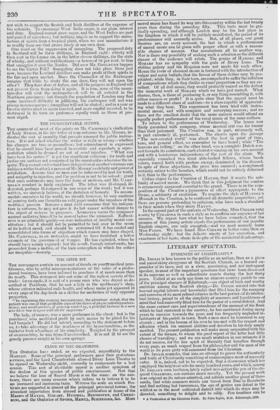THE INCONCEIVABLE MOTIVE.
THE comment of most of the prints on Mr. CAMPBELL'S vindication of Lady BYRON, in his late letter of remonstrance to Mr. MOORE, in- dicates the sort of morality that prevails amongst the public instruc- tors. It is not asked whether the writer is right or wrong—whether his charges are true or groundless ; but astonishment is expressed that he should have been moved to confute and reprobate a repre- sentation which he deemed an act of cruel injustice. "What can have been his motive ?" is yet the significant criticism ; for truth and justice are motives not recognized by the moral critics who raise the in- quiry. They cannot understand how inchignal ion at anotherswrongs can induce a writer to attack a person of Mr. Moo's celebrity and power of retaliation. Assume that no man can be influenced by zeal thr truth, and antipathy to injustice, and the problem is not to be solved ; grant that such sentiments may have the force of motives, and Mr. CAMP- BELL'S conduct is fairly explained. The letter was ill-shaped, ill- digested, perhaps ill-tempered in one sense of the word ; but it was written, we sincerely believe, at the dictation of honesty. To accom- modate ourselves to the world, we should, however, be very cautious of pouring forth our thoughts on cold paper under the impulses of the worthiest passion. Because a man feels conscious that his indigna- tion is virtuous, he may not give it its hot career without danger to the object of redress he proposes. LONGINUS warns the composer against suffering himself to be moved before the unmoved. Eatnest- ness is an admirable quality—a sure indication of healthy moral con- stitution ; but it should not be permitted to boil over in the scum of its hottest mood, and should be restrained till it has cooled and consolidated into forms of objection which reason may have shaped. Mr. CAMPBELL, as an instructer, ought to have furnished a better example of the government of temper. He has exploded, where he should have calmly exposed : but the result, though unfortunate, has proceeded from a motive, of the bare conception of which his critics are incapable—honesty.


















 Previous page
Previous page